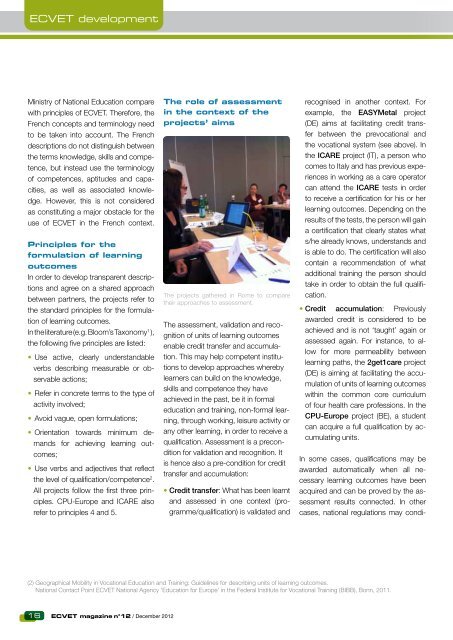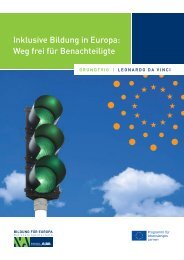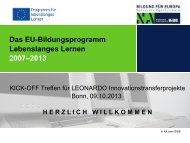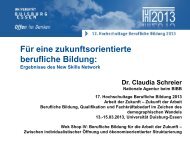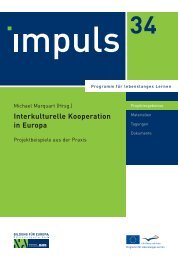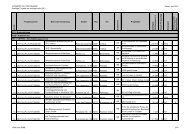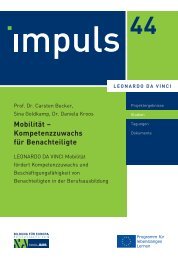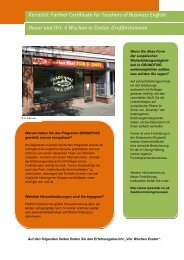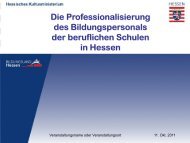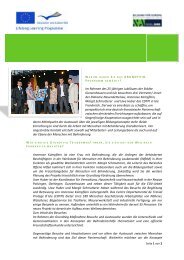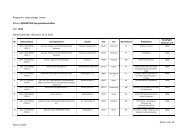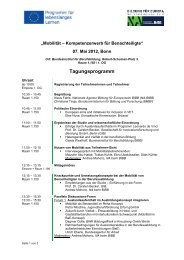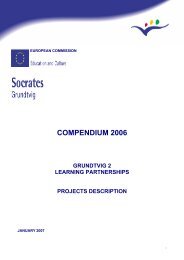You also want an ePaper? Increase the reach of your titles
YUMPU automatically turns print PDFs into web optimized ePapers that Google loves.
ECVET development<br />
Ministry of National Education compare<br />
with principles of ECVET. Therefore, the<br />
French concepts and terminology need<br />
to be taken into account. The French<br />
descriptions do not distinguish between<br />
the terms knowledge, skills and competence,<br />
but instead use the terminology<br />
of competences, aptitudes and capacities,<br />
as well as associated knowledge.<br />
However, this is not considered<br />
as constituting a major obstacle for the<br />
use of ECVET in the French context.<br />
Principles for the<br />
formulation of learning<br />
outcomes<br />
In order to develop transparent descriptions<br />
and agree on a shared approach<br />
between partners, the projects refer to<br />
the standard principles for the formulation<br />
of learning outcomes.<br />
In the literature (e.g. Bloom’s Taxonomy 1 ),<br />
the following five principles are listed:<br />
• Use active, clearly understandable<br />
verbs describing measurable or observable<br />
actions;<br />
• Refer in concrete terms to the type of<br />
activity involved;<br />
• Avoid vague, open formulations;<br />
• Orientation towards minimum demands<br />
for achieving learning outcomes;<br />
• Use verbs and adjectives that reflect<br />
the level of qualification/competence 2 .<br />
All projects follow the first three principles.<br />
CPU-Europe and ICARE also<br />
refer to principles 4 and 5.<br />
The role of assessment<br />
in the context of the<br />
projects’ aims<br />
The assessment, validation and recognition<br />
of units of learning outcomes<br />
enable credit transfer and accumulation.<br />
This may help competent institutions<br />
to develop approaches whereby<br />
learners can build on the knowledge,<br />
skills and competence they have<br />
achieved in the past, be it in formal<br />
education and training, non-formal learning,<br />
through working, leisure activity or<br />
any other learning, in order to receive a<br />
qualification. Assessment is a precondition<br />
for validation and recognition. It<br />
is hence also a pre-condition for credit<br />
transfer and accumulation:<br />
• Credit transfer: What has been learnt<br />
and assessed in one context (programme/qualification)<br />
is validated and<br />
recognised in another context. For<br />
example, the EASYMetal project<br />
(DE) aims at facilitating credit transfer<br />
between the prevocational and<br />
the vocational system (see above). In<br />
the ICARE project (IT), a person who<br />
comes to Italy and has previous experiences<br />
in working as a care operator<br />
can attend the ICARE tests in order<br />
to receive a certification for his or her<br />
learning outcomes. Depending on the<br />
results of the tests, the person will gain<br />
a certification that clearly states what<br />
s/he already knows, understands and<br />
is able to do. The certification will also<br />
contain a recommendation of what<br />
additional training the person should<br />
take in order to obtain the full qualification.<br />
• Credit accumulation: Previously<br />
awarded credit is considered to be<br />
achieved and is not ‘taught’ again or<br />
assessed again. For instance, to allow<br />
for more permeability between<br />
learning paths, the 2get1care project<br />
(DE) is aiming at facilitating the accumulation<br />
of units of learning outcomes<br />
within the common core curriculum<br />
of four health care professions. In the<br />
CPU-Europe project (BE), a student<br />
can acquire a full qualification by accumulating<br />
units.<br />
In some cases, qualifications may be<br />
awarded automatically when all necessary<br />
learning outcomes have been<br />
acquired and can be proved by the assessment<br />
results connected. In other<br />
cases, national regulations may condi-<br />
(2) Geographical Mobility in Vocational Education and Training: Guidelines for describing units of learning outcomes.<br />
National Contact Point ECVET National Agency ’Education for Europe’ in the Federal Institute for Vocational Training (BIBB), Bonn, 2011.<br />
16 ECVET magazine n°12 / December 2012<br />
The projects gathered in Rome to compare<br />
their approaches to assessment.


